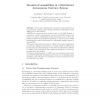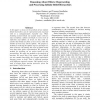301 search results - page 58 / 61 » Designing protocols for agent institutions |
AP2PC
2005
Springer
14 years 1 months ago
2005
Springer
Peer-to-peer complementary currencies can be powerful tools for promoting exchanges and building sustainable relationships among selfish peers on the Internet. i-WAT[10] is a prop...
WWW
2003
ACM
14 years 8 months ago
2003
ACM
An important objective of the Semantic Web is to make Electronic Commerce interactions more flexible and automated. To achieve this, standardization of ontologies, message content...
ECAI
2004
Springer
14 years 27 days ago
2004
Springer
Learning general truths from the observation of simple domains and, further, learning how to use this knowledge are essential capabilities for any intelligent agent to understand ...
ACMICEC
2003
ACM
14 years 23 days ago
2003
ACM
A multi-agent marketplace, MAGNET (Multi AGent Negotiation Testbed), is a promising solution to conduct online combinatorial auctions. The trust model of MAGNET is somewhat diffe...
ICMAS
2000
13 years 8 months ago
2000
In this paper we focus on the problem of how infinite belief hierarchies can be represented and reasoned with in a computationally tractable way. When modeling nested beliefs one ...


